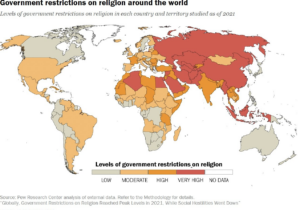Gunmen in Nigeria opened the New Year 2024 by killing 14 Christians on their way home from a midnight church service. The attack rocked the country’s Christian community, still reeling from a Christmas Eve massacre that claimed the lives of 130 believers. These attacks are just the latest in a disturbing trend of increasing violence against Christians in Nigeria, which some are calling a genocide.
Since the year 2000, 62,000 Christians have been murdered in Nigeria, prompting President Trump to place Nigeria on its list of violators of religious freedom. Biden removed Nigeria from the list, and last year alone, more than 8,000 Christians were killed.
In a report by the International Society for Civil Liberties and Rule of Law, between January 2022 and January 2023, 8,400 Christians were abducted, 840 of whom never returned alive from captivity. Many of these abductions have been attributed to the military and the police, some to Islamic Terror Jihadists, while others have been attributed to Fulani militias, who are also accused of having killed 600 captives. Priests and seminarians have been abducted, churches destroyed, Christian communities have been sacked, and millions of Christians and targeted Muslims have been displaced, either becoming internally displaced people (IDPs) or crossing international borders to become refugees.
In its annual report on Nigeria, the United States Commission on International Religious Freedom (USCIRF) identified a persistent pattern of violence and repression. It pointed out that acts of repression were carried out by both government and non-government entities. Christians bore the brunt of this violence, facing atrocities such as attacks by militant Islamists, various forms of identity-based violence, and mob attacks. Sadly, these assaults often went unchecked by the government.
It seems evident that the government is showing favoritism toward certain terrorist groups by shifting blame onto others. One example occurred in June 2022, when the Nigerian government attributed the brutal murders of over 50 parishioners at St. Francis Xavier Church in Owo to the Islamic State West Africa Province (ISWAP). However, local residents asserted that the attacks were carried out by Fulani militia, a group which the government has thus far refrained from naming.
The Fulani militias, also known as Fulani herders, originate from a predominantly Muslim nomadic tribe. They primarily target non-Muslim communities, particularly Christian ones, and by 2014, they had been identified as the fourth most lethal terrorist organization by the Global Terrorism Index. According to Christian Solidarity Worldwide, the Nigerian government has failed to acknowledge the ongoing violence perpetrated by the Fulani. In contrast, similar acts of terrorism committed by Boko Haram have been recognized by the Nigerian government and covered in the international press, while attacks by the Fulani remain unrecognized.
Another area of repression directly attributed to the Nigerian government is the enforcement of blasphemy laws within its criminal and Sharia-based legal systems. Christians and moderate Muslims have faced imprisonment or other punishment for blasphemy, with some cases reaching the United Nations. A further example of the government’s culpability is its implication in a prolonged campaign of forced abortions conducted by the Nigerian military, targeting individuals rescued from Boko Haram captivity even though abortion, let alone forced abortion, is illegal in Nigeria.
Some religious leaders believe the attacks constitute a systematic effort to eradicate the Christian population in specific regions. Bishop Wilfred Anagbe of the Nigerian Diocese of Makurdi in Benue State, addressing a breakfast gathering on Capitol Hill on Jan. 30, 2024, stated that the situation in Nigeria amounts to a genocide against Christians.
The Nigerian government’s response, whether it is unwilling or incapable of quelling the violence, has been criticized for its inadequacy, with accusations of turning a blind eye or even complicity. The government’s failure to acknowledge the persistent attacks on Christians has led Genocide Watch, an organization led by former professor of Genocide Studies at George Mason University Gregory Stanton, to categorize Nigeria at Stage 9: Extermination and Stage 10: Denial. Genocide Watch is calling for “the U.N. and Nigerian government to establish an independent fact-finding commission of inquiry to investigate attacks on Christian and Muslim farmers and report to the Nigerian government and U.N. Human Rights Council.”
The Alliance Defending Freedom International (ADF) has urged the Biden White House to put Nigeria back on the list of countries of particular concern (CPC). In January, the United States Commission on International Religious Freedom (USCIRF) also recommended Nigeria for designation as a CPC. On February 6th, the US House of Representatives Foreign Affairs Committee challenged the Biden administration’s inaction on Nigeria’s religious freedom violations. The House passed the Nigeria Resolution, demanding that President Biden designate Nigeria as a CPC for its participation in and tolerance of systematic and ongoing violations of religious freedom, particularly against Christians.





